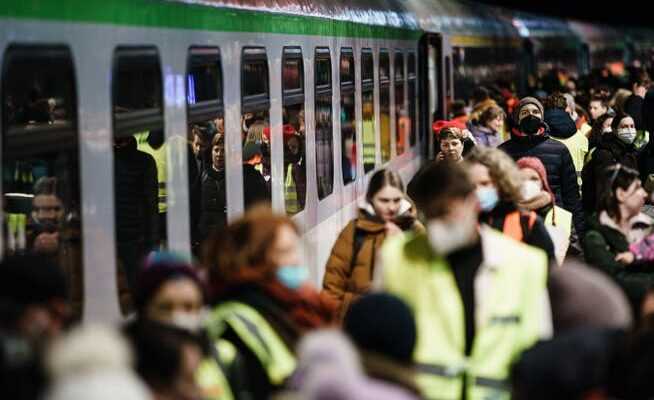Germany has learned little from its mistakes of 2015. Refugee policy needs humanity and the rule of law. This is the only way to really help the victims of Putin’s war.
Thousands of refugees from Ukraine arrive in Germany every day, here at Berlin Central Station.

Alexander Kissler, editor of the “Neue Zürcher Zeitung” in Berlin
You are reading an excerpt from the weekday newsletter “The Other View”, published today by Alexander Kissler, editor of the NZZ in Berlin. Subscribe to the newsletter for free. Not resident in Germany? Benefit here.
For those who do not have a heart of stone, the suffering of Ukraine fills them with anger, sadness and despair. Russian bombs fall on Kharkiv, Mariupol, Chernihiv. The warlord in the Kremlin wants it that way. People fleeing death and destruction are entitled to protection. It is all the more bitter when a country like Germany only partially fulfills its solidarity obligations because it stumbles into a double loss of control. Neither at the borders nor inland does the Federal Republic have the effects of the war under control.
The cities send SOS
In such challenging times, no one demands that there be a master plan for every problem that only needs to be worked through. Wars and their consequences are the ultimate stress test for every crisis scenario, no matter how thoroughly worked out. But the people involved must be measured by their own words.
After Russia’s attack on Ukraine, the Federal Minister of the Interior, Nancy Faeser (SPD), declared that Germany was “extremely attentive, vigilant and prepared”, also with regard to the consequences of the war of aggression for the refugee movements in Europe. Today it is evident that Germany was by no means prepared, neither internally nor externally.
German cities broadcast SOS almost every hour because they are reaching the limit of their capacities. Hamburg’s Interior Senator Andy Grote observes an influx of refugees “like we haven’t seen in decades” – not even during the migration crisis of 2015, when around one and a half million people came to the country. In Stuttgart, the previous places are occupied, the city declared an “extraordinary situation”. The state of Brandenburg also reports full occupancy.
Things are going to be dramatic in Berlin, where five initial reception centers are planned and up to 15,000 people are expected to enter the country every day. So far, around 150,000 refugees have been officially counted throughout Germany. The one million mark is likely to be exceeded if the war continues.
Germany prefers not to know exactly
The loss of control is not only reflected in the fact that the distribution of refugees across the states and municipalities is faltering, the arrival centers are too small, there is a lack of beds and care, and disaster control is once again failing. Without the volunteers, the situation would have collapsed in many places.
To make matters worse, there is a stubborn refusal to draw the right conclusions from the mistakes of 2015. Precisely because the Ukrainians who have fled are entitled to protection and care, the state should not be indifferent to who enters its territory. In fact, the Federal Republic of Germany once again does not want to know exactly.
The admonitions of practitioners and the messages of responsible politicians diverge. From the ranks of the Federal Police, which is responsible for border protection, there are reports of trains in which the majority were so-called third-country nationals, primarily people from African countries. A Berlin police officer who was on duty in the overcrowded central station blurted out annoyed: “Half of the Balkans arrive here.”
Police unionists are demanding regular controls at the borders with Poland and the Czech Republic. These borders have not yet been notified, which means that Germany has not restricted entry to specific crossings and has therefore not created the conditions for stationary controls. The police officers remain dependent on random checks. Nobody knows exactly which arriving people have already been registered in other EU countries.
A doubly blurred look
If Germany were serious about asserting sovereignty over its territory, enforcing sovereignty and just about guaranteeing the best possible reception for those in need, it would control its borders. The currents could be equalized at an early stage. But the interior minister refuses and the chancellor remains silent.
Instead, as in 2015, the signal is sent out that everyone has a right to entry and support. The Minister of the Interior wants to take everyone in, regardless of their passport. She makes it clear that she is not interested in identity checks. The Chairman of the Federal Council and Thuringian Prime Minister Bodo Ramelow (Left Party) made a similar statement.
With eyes wide open, Germany staggers into an avoidable overload. Anyone who doesn’t care who enters their country is doing neither the locals nor the newcomers any favours. Those who look the other way at their borders also have a blurred view of the conditions within. It is time for the chancellor to explain how he intends to strike a balance between humanity and the rule of law.
